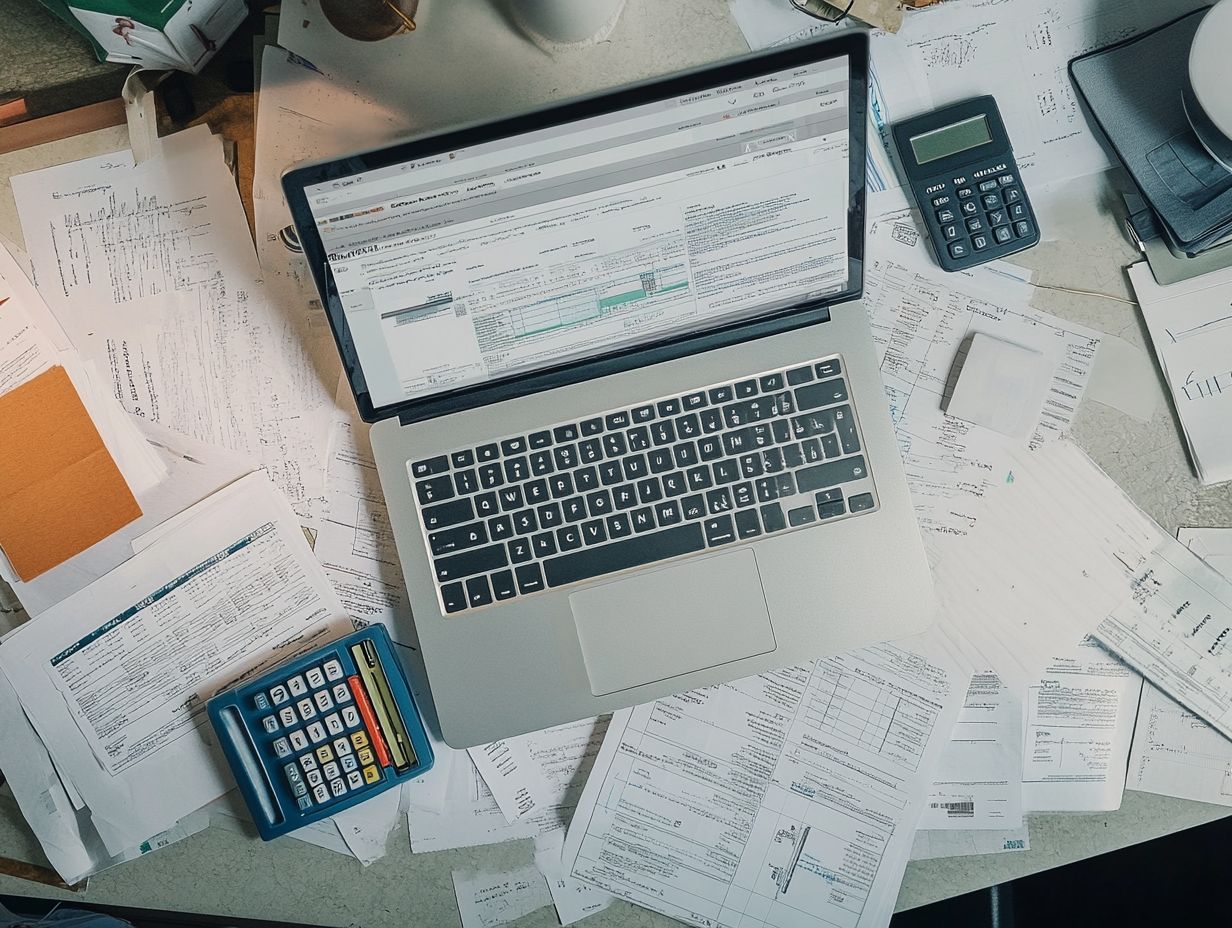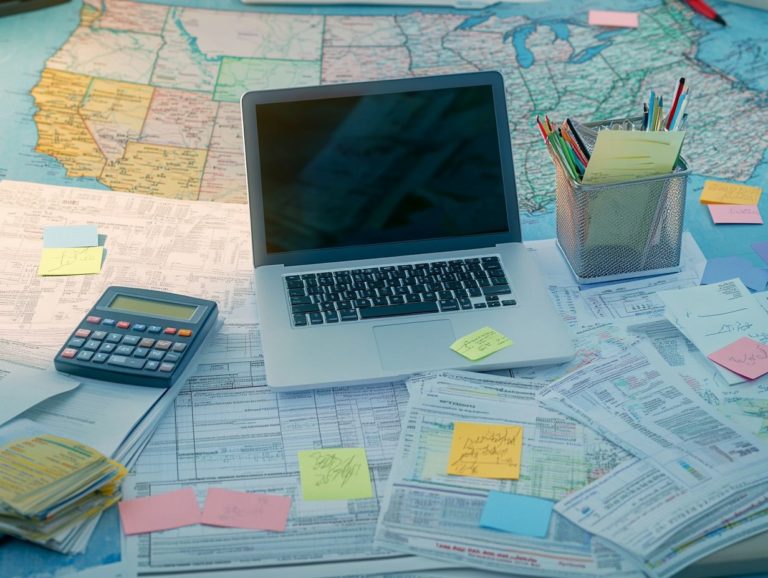How to Prepare for Tax Season as a Freelancer
Navigating the world of taxes can feel overwhelming, particularly for freelancers who balance multiple income streams and expenses. Understanding your tax obligations is essential to prevent any surprises when tax season arrives.
This guide clarifies the various types of taxes freelancers encounter, provides tips on organizing your finances, and emphasizes strategies to maximize deductions and credits. Don’t wait until the last minute to prepare for tax season!
Whether you’re determining the right tax forms or contemplating the benefits of hiring a tax professional, this information will streamline the process and ensure you are thoroughly prepared for tax time.
Contents
- Your Key Tax Takeaways!
- Understanding Tax Obligations for Freelancers
- Organizing Your Finances for Tax Season
- Maximizing Deductions and Credits
- Filing Taxes as a Freelancer
- Tips for Working with a Tax Professional
- Frequently Asked Questions
- What documents do I need to prepare for tax season as a freelancer?
- How can I keep track of my income and expenses throughout the year?
- Are there any deductions that I can claim as a freelancer?
- What is the deadline for filing taxes as a freelancer?
- Should I consider hiring a tax professional to help me with my taxes as a freelancer?
- Can I make estimated tax payments as a freelancer?
Your Key Tax Takeaways!

- Understand your tax obligations as a freelancer and the different types of taxes you may be liable for.
- Stay organized by tracking your income and expenses, while separating personal and business finances.
- Maximize deductions and credits to minimize your tax liability, including common deductions for freelancers and available tax credits.
Understanding Tax Obligations for Freelancers
Freelancers handle more than just reporting their income. They encounter distinct tax obligations that necessitate a thorough grasp of the diverse forms of income and expenses associated with managing their independent businesses.
Understanding tax rules is crucial, as it involves savvy navigation of deductions and strict adherence to both federal and local laws.
Recognizing these financial duties can empower freelancers to take charge of their taxes. Crafting informed tax strategies ensures compliance while optimizing savings on their tax returns and savings.
Different Types of Taxes for Freelancers
As a freelancer, you must navigate a myriad of taxes, including self-employment tax, federal income tax, and the estimated taxes required by the Internal Revenue Service (IRS). Unlike traditional employees who have taxes conveniently withheld from their paychecks, you receive 1099 forms, making you responsible for reporting your income and paying any applicable taxes directly.
Understanding these tax requirements is essential for effectively managing your financial responsibilities. For many, the self-employment tax can feel like a significant weight, as it includes contributions to both Social Security and Medicare.
It’s crucial to stay informed about your state tax obligations, which can vary greatly based on your location and the nature of your work. Being diligent in tracking your income sources helps ensure accuracy when tax season arrives.
This proactive approach not only helps you meet your federal obligations but also plays a vital role in crafting a reliable financial plan that accommodates growth, investments, and potential future expenses.
Organizing Your Finances for Tax Season
Organizing your finances for tax season is crucial as a freelancer, setting the stage for accurate reporting and maximizing your deductions. Proper financial organization means meticulously tracking all your income sources and categorizing your expenses to stay compliant with IRS requirements.
By leveraging effective software solutions, you can streamline this process, ensuring that your records are clear and comprehensive. This preparation gives you the power to make informed decisions as you navigate your tax obligations with confidence.
Tracking Income and Expenses
For freelancers, tracking income and expenses accurately is essential for maintaining compliance and maximizing tax deductions. By keeping meticulous records of all financial transactions like invoices and receipts you can tackle tax season with confidence!
Using accounting software, such as Pink Moon Financial or Statista, can significantly streamline this process. These tools offer an organized system for managing your finances, making it effortless to track your income and expenses.
Dedicated tools simplify record-keeping and enhance your financial insights through data visualization and reporting features. Many software solutions provide automated expense tracking by linking your bank accounts and credit cards. This reduces the need for manual entry and minimizes the risk of errors, allowing you to focus on your creative pursuits.
Review your financial records regularly to catch discrepancies early! By integrating these technologies into your workflow, you can achieve better financial health and grow your business with confidence.
Separating Personal and Business Finances

Separating your personal and business finances is essential for freelancers. It streamlines your tax preparation and maximizes your deductions. By setting up distinct accounts for your business transactions, you can eliminate confusion, minimize liability risks, and ensure only eligible expenses are considered for deductions.
This clear division simplifies your tax filing process and enhances your overall financial management. Utilizing dedicated business banking accounts helps establish a boundary, making it easy to track your income and expenses while maintaining detailed financial records.
By keeping your personal and business finances separate, it’s easier to assess your business’s performance over time. This organization protects your personal assets from business liabilities and creates a cushion that supports your long-term financial health.
Adopting this practice can lead to more favorable tax deductions during audits, providing you peace of mind and allowing you to focus fully on your creative work and client relationships!
Maximizing Deductions and Credits
Maximizing deductions and credits is a cornerstone of tax planning for freelancers, profoundly influencing your overall tax liability. By understanding which expenses qualify as tax-deductible, you can significantly lower your taxable income and enhance your financial standing.
The IRS permits a range of deductions for business-related expenses. Leveraging these opportunities can yield substantial savings in your tax strategy, especially for self-employed individuals.
Common Deductions for Freelancers
Freelancers can take advantage of common deductions that directly lower your taxable income. These include expenses related to your home office setup, travel for client meetings, and essential work supplies.
Exploring these categories can uncover potential savings that enhance your financial situation. For example, home office deductions allow you to write off a portion of your residence expenses, such as rent or utilities, if you exclusively use a designated area for business activities.
When traveling to meet clients, expenses like mileage, lodging, and meals may qualify for deductions. This helps offset costs associated with business travel. Furthermore, education-related expenses, such as courses or workshops for skill enhancement, can also be deducted! This not only reduces your tax burden but also supports your professional development.
Effectively utilizing these deductions enables you to manage your tax liabilities intelligently while contributing to your ongoing success and financial growth.
Tax Credits for Freelancers
Tax credits are truly invaluable for freelancers, providing direct reductions in your tax liability and the potential for significant savings. Understanding the qualifications and types of tax credits available gives you the power to effectively leverage these financial benefits. This ultimately enhances your financial well-being.
By exploring various credits, such as the Earned Income Tax Credit (EITC) and the Self-Employed Health Insurance Deduction, you can uncover opportunities to alleviate your financial burden significantly. Eligibility for these credits often depends on factors like your income levels, filing status, and the expenses you’ve incurred throughout the year. You need to pay close attention when applying, including maintaining accurate records and grasping specific rules set by the Internal Revenue Service, which is the government agency that collects taxes.
Maximizing these tax credits not only eases immediate financial pressures but also contributes to long-term economic stability. With this financial cushion, you can invest more in your business and future growth, setting the stage for sustained success.
Filing Taxes as a Freelancer
Filing taxes as a freelancer presents a distinct set of requirements and considerations that set you apart from traditional employees. It’s crucial for you to be well-acquainted with the specific tax forms and deadlines involved.
Typically, freelancers file their returns using Form 1040 in conjunction with Schedule C. Understanding the details of these forms, along with their associated deadlines, is vital for ensuring compliance with IRS regulations. Additionally, maximizing deductions can greatly benefit freelancers during tax season.
Choosing the Right Tax Form

Choosing the right tax form is absolutely essential for freelancers, as it directly impacts how you report your income and expenses to the IRS. Most freelancers like yourself will find that Form 1040, paired with Schedule C, is the way to go for reporting profit or loss from your business. This combination ensures that your income is accurately reflected, and you can maximize those allowable deductions. The choice you make here can significantly affect your tax liability.
Understanding the details of these forms can be a true game-changer in your freelancing journey. While Form 1040 serves as your primary tax return form, Schedule C plays a crucial role in detailing your self-employment income and documenting your expenses. To avoid common pitfalls, many freelancers benefit from learning about the top tax mistakes freelancers make and how to avoid them. Many also work with various professionals, including accountants and consulting firms, to ensure they are making the most of their available options.
By effectively utilizing Schedule C, you can capitalize on various deductions think home office expenses, supplies, and even certain travel costs. This strategy not only reduces your taxable income but also becomes a pivotal part of your overall tax planning. Also, consider how your business structure whether an LLC (Limited Liability Company, which protects your personal assets), Sole proprietorship, C corporation, or S corporation affects your financial situation.
Important Deadlines and Extensions
As a freelancer, it s essential to keep a sharp eye on important deadlines to ensure timely filing and compliance with IRS regulations. Missing these deadlines can lead to penalties and increased liability, which is something you definitely want to avoid.
Staying informed about recent changes to forms can help you remain compliant. For example, understanding the 1099-NEC can further assist in your compliance efforts.
Typically, the deadline for filing tax returns falls on April 15, but you can apply for extensions to file later, as long as you follow the specified guidelines. This flexibility is crucial for contractors and owners of small businesses who may need more time to gather necessary documentation.
Don’t forget, extensions only apply to filing, not payment! You re generally required to make quarterly estimated tax payments throughout the year, with deadlines set for April, June, September, and January.
Utilizing software like Xero or Bonsai can make tracking these payments much easier. Failing to make these payments on time can result in penalties, adding to your financial burden.
If you find yourself needing more time, you must file Form 4868 to request an extension. However, keep in mind that this does not exempt you from paying estimated taxes.
Consider consulting with a tax professional, like those at Pink Moon Financial or Westwood Tax & Consulting, for tailored advice. Understanding these timelines and processes can help you navigate tax season smoothly and avoid unnecessary complications.
When in doubt, always reach out for advice from certified professionals who can guide you.
Tips for Working with a Tax Professional
Partnering with a tax professional can transform your financial experience. They can provide expert insights on understanding complex tax rules and refining your financial strategies.
A qualified tax professional recognizes the distinct challenges you encounter. They can expertly navigate you through the complexities of IRS requirements, ensuring compliance while also helping you to maximize your deductions and credits.
They can guide you on retirement plans that comply with Social Security and Medicare obligations.
Benefits of Hiring a Tax Professional
Hiring a tax professional can greatly benefit you as a freelancer, providing expert guidance on navigating tax laws, optimizing your deductions, and ensuring your reporting to the IRS is spot on. With a professional by your side, you gain peace of mind knowing you re in compliance with your financial obligations.
This partnership can save you a considerable amount of time. It enables you to concentrate more on your creative pursuits instead of getting entangled in paperwork.
For example, tax professionals can develop tailored tax strategies that enhance your financial planning, helping you budget effectively for quarterly tax payments and uncovering potential credits you might have missed.
They can also offer invaluable insights into retirement plans that cater specifically to self-employed individuals. This ensures that you not only meet your current obligations but also secure a prosperous financial future.
Ultimately, this reduces the stress that often accompanies tax season, allowing you to approach your work with renewed confidence and enjoyment.
Take charge of your finances today and enjoy peace of mind during tax season!
How to Find and Work with a Tax Professional
Finding the right tax professional is crucial for freelancers like you. This ensures you receive advice and services tailored to your unique financial needs.
By evaluating qualifications, experience, and client relationships, you can select a tax advisor who truly understands the specific challenges you face and can support your financial planning effectively.
To streamline this process, start by seeking referrals from peers or exploring online forums where fellow self-employed individuals share their experiences. During initial consultations, don’t hesitate to ask probing questions. How does the advisor stay updated on changes in tax laws? How would they handle specific deductions unique to freelance work, like home office expenses or equipment purchases? Additionally, it’s important to understand how to handle back taxes as a freelancer to ensure you’re fully prepared.
Establishing a solid working relationship with your chosen tax helper is vital. Open communication leads to better insights and more effective tax strategies, ultimately benefiting your finances. This partnership can also ensure you’re aware of any new marketing opportunities that can arise from tax changes.
Frequently Asked Questions

What documents do I need to prepare for tax season as a freelancer?
As a freelancer, gather all your income and expense documents. You ll need items such as:
- 1099-NEC forms (a form used to report income for freelancers)
- Invoices
- Receipts
- Bank statements
Being organized with this documentation will pay off when tax season arrives!
How can I keep track of my income and expenses throughout the year?
You can use accounting software such as Xero or a spreadsheet to track your income and expenses. Make sure to categorize each transaction correctly for easier tax preparation. This can simplify your reporting.
Are there any deductions that I can claim as a freelancer?
Yes! As a freelancer, you may claim deductions for business-related expenses, including:
- Home office expenses
- Equipment purchases
- Business travel
- Marketing expenses for services you provide
What is the deadline for filing taxes as a freelancer?
The tax filing deadline for freelancers is April 15th, unless you file for an extension. It is important to file on time to avoid penalties and interest charges. Don t wait until the last minute start gathering your documents today!
Ensuring you have a solid plan in place with your tax professional can greatly assist in meeting this deadline.
Should I consider hiring a tax professional to help me with my taxes as a freelancer?
If you are not familiar with tax laws and regulations, it is recommended to seek the help of a tax professional. They can ensure your taxes are filed correctly and help you maximize deductions, providing insights that might be overlooked.
Can I make estimated tax payments as a freelancer?
Yes! As a freelancer, you are responsible for paying estimated taxes throughout the year. This can help you avoid a large tax bill at the end of the year and any potential penalties for underpayment.
Working with a qualified accountant can help you plan these payments effectively.
Need help? Contact a tax professional today to ensure you re on the right track!






